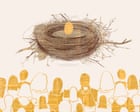A new study doubles the number of species at risk of extinction to 2m, driven by the latest data on insects. Losing these tiny creatures would have huge implications for life on Earth
Read more: Number of species at risk of extinction doubles to 2 million, says study
Cut an apple in half, and the white flesh reveals a cluster of black pips arranged in the shape of a star. It is a tiny constellation of seeds hidden in the fruit bowl. But it reveals an interlinked universe of pollination and nature’s abundance – a delicate system, and one that can easily be thrown off course.
When the apple blossoms are pollinated, seeds pump out hormones telling the plant to produce the right vitamins, minerals and rate of growth. They help formulate crunchiness, size and shape. Lose those pollinators, however, and this fragile system becomes unbalanced. If only three or four of the seeds get pollinated, our apple may grow lopsided. The nutritional value might decrease, as could the shelf-life of the fruit, turning it brown and wrinkled before its time.








More Stories
The latest twist in a Canadian medical mystery – podcast
Sperm from cancer-risk donor used to conceive at least 67 children across Europe
Elon Musk shows he still has the White House’s ear on Trump’s Middle East trip